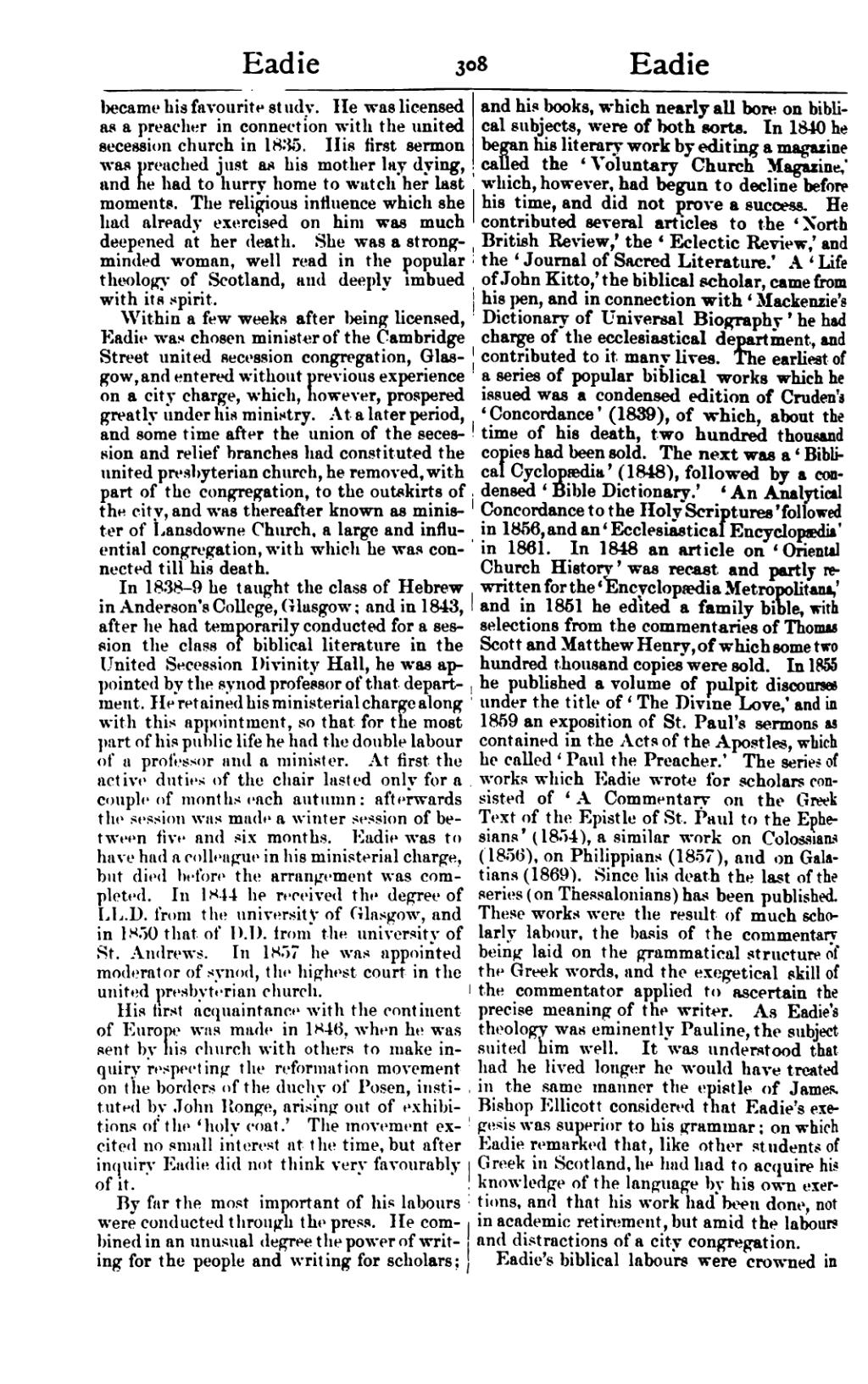became his favourite study. He was licensed as a preacher in connection with the united secession church in 1835. His first sermon was preached just as his mother lay dying, and he had to hurry home to watch her last moments. The religious influence which she had already exercised on him was much deepened at her death. She was a strong-minded woman, well read in the popular theology of Scotland, and deeply imbued with its spirit.
Within a few weeks after being licensed, Eadie was chosen minister of the Cambridge Street united secession congregation, Glasgow, and entered without previous experience on a city charge, which, however, prospered greatly under his ministry. At a later period, and some time after the union of the secession and relief branches had constituted the united presbyterian church, he removed, with part of the congregation, to the outskirts of the city, and was thereafter known as minister of Lansdowne Church, a large and influential congregation, with which he was connected till his death.
In 1838–9 he taught the class of Hebrew in Anderson's College, Glasgow; and in 1843, after he had temporarily conducted for a session the class of biblical literature in the United Secession Divinity Hall, he was appointed by the synod professor of that department. He retained his ministerial charge along with this appointment, so that for the most part of his public life he had the double labour of a professor and a minister. At first the active duties of the chair lasted only for a couple of months each autumn; afterwards the session was made a winter session of between five and six months. Eadie was to have had a colleague in his ministerial charge, but died before the arrangement was completed. In 1844 he received the degree of LL.D. from the university of Glasgow, and in 1850 that of D.D. from the university of St. Andrews. In 1857 he was appointed moderator of synod, the highest court in the united presbyterian church.
His first acquaintance with the continent of Europe was made in 1846, when he was sent by his church with others to make inquiry respecting the reformation movement on the borders of the duchy of Posen, instituted by John Ronge, arising out of exhibitions of the ‘holy coat.’ The movement excited no small interest at the time, but after inquiry Eadie did not think very favourably of it.
By far the most important of his labours were conducted through the press. He combined in an unusual degree the power of writing for the people and writing for scholars; and his books, which nearly all bore on biblical subjects, were of both sorts. In 1840 he began his literary work by editing a magazine called the ‘Voluntary Church Magazine,’ which, however, had begun to decline before his time, and did not prove a success. He contributed several articles to the ‘North British Review,’ the ‘Eclectic Review,’ and the ‘Journal of Sacred Literature.’ A ‘Life of John Kitto,’ the biblical scholar, came from his pen, and in connection with ‘Mackenzie's Dictionary of Universal Biography’ he had charge of the ecclesiastical department, and contributed to it many lives. The earliest of a series of popular biblical works which he issued was a condensed edition of Cruden's ‘Concordance’ (1839), of which, about the time of his death, two hundred thousand copies had been sold. The next was a ‘Biblical Cyclopædia’ (1848), followed by a condensed ‘Bible Dictionary.’ ‘An Analytical Concordance to the Holy Scriptures’ followed in 1856, and an ‘Ecclesiastical Encyclopædia’ in 1861. In 1848 an article on ‘Oriental Church History’ was recast and partly rewritten for the ‘Encyclopædia Metropolitana,’ and in 1851 he edited a family bible, with selections from the commentaries of Thomas Scott and Matthew Henry, of which some two hundred thousand copies were sold. In 1855 he published a volume of pulpit discourses under the title of ‘The Divine Love,’ and in 1859 an exposition of St. Paul's sermons as contained in the Acts of the Apostles, which he called ‘Paul the Preacher.’ The series of works which Eadie wrote for scholars consisted of ‘A Commentary on the Greek Text of the Epistle of St. Paul to the Ephesians’ (1854), a similar work on Colossians (1856), on Philippians (1857), and on Galatians (1869). Since his death the last of the series (on Thessalonians) has been published. These works were the result of much scholarly labour, the basis of the commentary being laid on the grammatical structure of the Greek words, and the exegetical skill of the commentator applied to ascertain the precise meaning of the writer. As Eadie's theology was eminently Pauline, the subject suited him well. It was understood that had he lived longer he would have treated in the same manner the epistle of James. Bishop Ellicott considered that Eadie's exegesis was superior to his grammar; on which Eadie remarked that, like other students of Greek in Scotland, he had had to acquire his knowledge of the language by his own exertions, and that his work had been done, not in academic retirement, but amid the labours and distractions of a city congregation.
Eadie's biblical labours were crowned in
